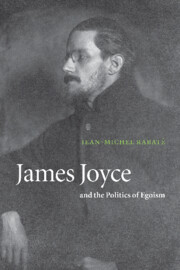Book contents
- Frontmatter
- Contents
- Preface
- List of abbreviations
- 1 Après mot, le déluge: the ego as symptom
- 2 The ego, the nation, and degeneration
- 3 Joyce the egoist
- 4 The esthetic paradoxes of egoism: from negoism to the theoretic
- 5 Theory's slice of life
- 6 The egoist vs. the king
- 7 The conquest of Paris
- 8 Joyce's transitional revolution
- 9 Hospitality and sodomy
- 10 Hospitality in the capital city
- 11 Joyce's late Modernism and the birth of the genetic reader
- 12 Stewardship, Parnellism, and egotism
- Notes
- Bibliography
- Index
12 - Stewardship, Parnellism, and egotism
Published online by Cambridge University Press: 22 September 2009
- Frontmatter
- Contents
- Preface
- List of abbreviations
- 1 Après mot, le déluge: the ego as symptom
- 2 The ego, the nation, and degeneration
- 3 Joyce the egoist
- 4 The esthetic paradoxes of egoism: from negoism to the theoretic
- 5 Theory's slice of life
- 6 The egoist vs. the king
- 7 The conquest of Paris
- 8 Joyce's transitional revolution
- 9 Hospitality and sodomy
- 10 Hospitality in the capital city
- 11 Joyce's late Modernism and the birth of the genetic reader
- 12 Stewardship, Parnellism, and egotism
- Notes
- Bibliography
- Index
Summary
The birth of a new reader may not be as momentous as the birth of a new nation, but Joyce's hope is that in the end the two notions will merge. We have seen how he moved from an early anarchistic and esthetic egoism to a broader conception of hospitality understood as the ability of one language to welcome all the other languages (which entails generalizing “bilinguism” to include the whole world). The issue evolves from an egoistic refusal to serve any master or cause to a concern with “owning” the new language. The issue of ownership should also – and here is the difficult transition – attack the ideological veils that perpetuate oppression. Religion will no doubt have its role to play in that context, since already for Marx, religion provided the main theoretical model with which one could understand (and therefore criticize) the very nature of ideology. For Marx and Engels, thinkers like Hegel, Bruno Bauer, Feuerbach and Max Stirner all performed a religious trick by which the economic basis of society was misread and mystified, veiled in the name of pseudo-transcendent entities such as Man, the Spirit, or the Ego. For Stirner, however, Marx and Engels merely replaced one system of domination with another.
In Stirner's view, egoism does not stem from simple “self-interest” but aims at “ownness” that is “self-mastery,” a form of individual autonomy.
- Type
- Chapter
- Information
- James Joyce and the Politics of Egoism , pp. 209 - 218Publisher: Cambridge University PressPrint publication year: 2001



